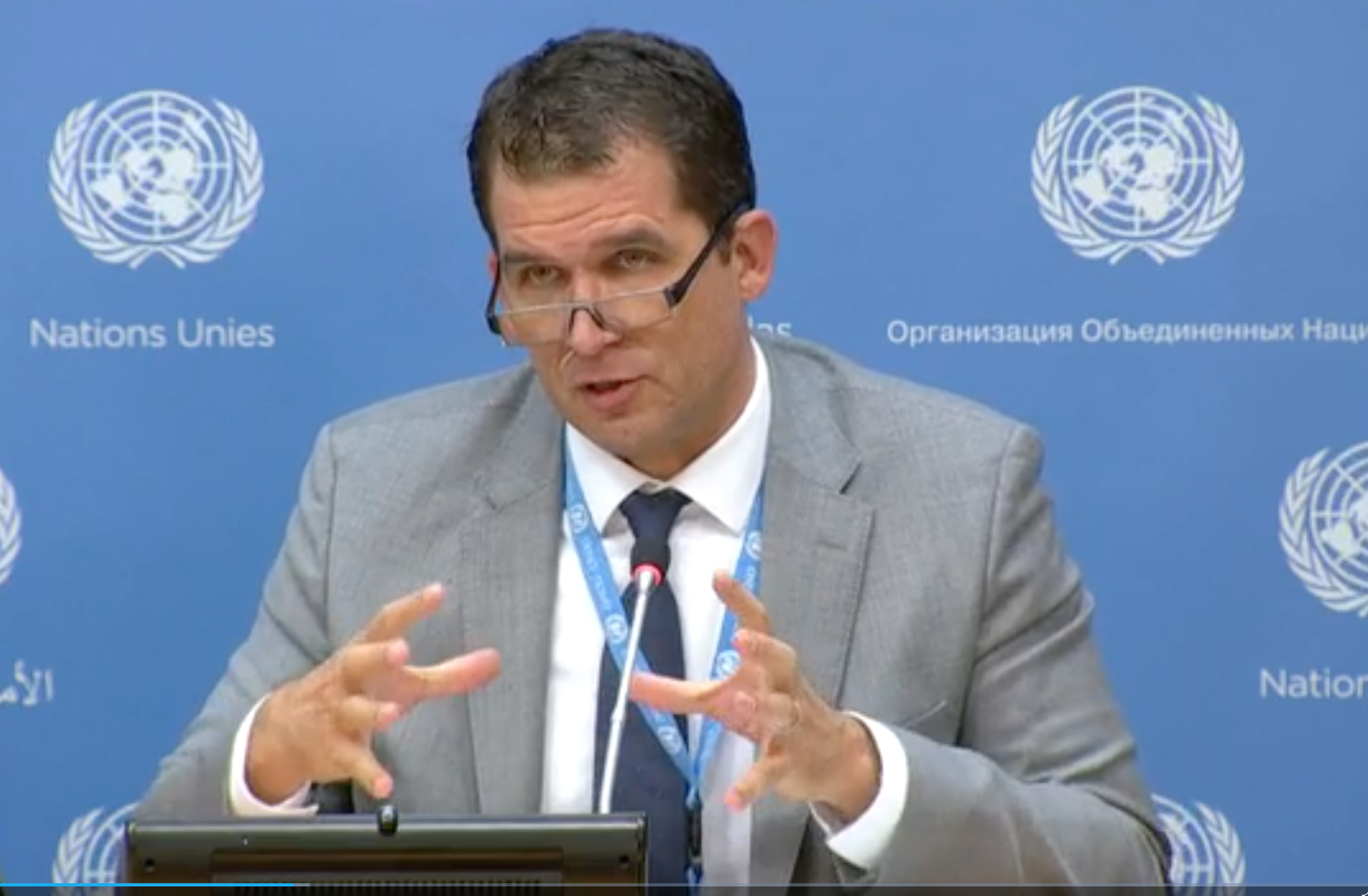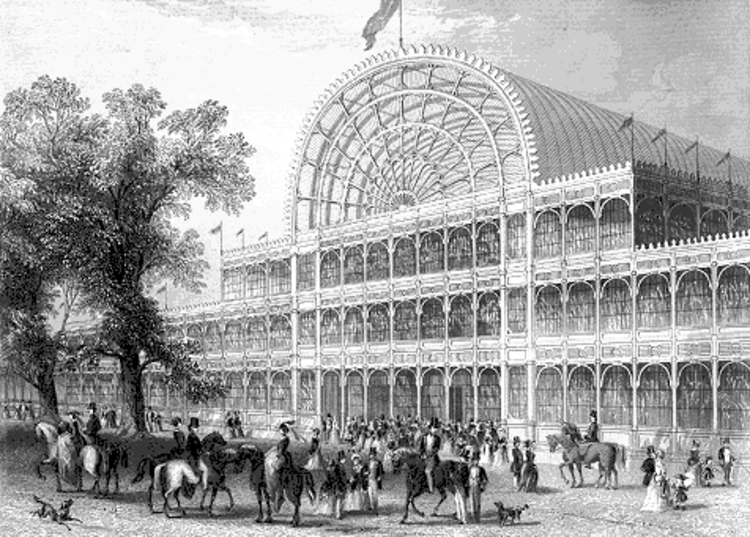
Thursday 28th November, 2019, 5.50-8.30 pm in St Pancras New Church, Euston Road, London, UK
Organisers:
Deepa Govindarajan Driver (University of Reading)
Iain Munro (University of Newcastle)
The following account is based on the notes that I took at the event. To the best of my belief it is not materially incorrect, but I would welcome any corrections sent to catherine@catherinebrown.org.
It was written at the invitation of, and is published with the approval of, the event’s organiser, Deepa Driver (@deepa_driver).
The speeches were filmed by Gordan Dimmack, and may be viewed here.
The views expressed are the speakers’ own. I reproduce them in order to express support for the event, for Julian Assange, and for Wikileaks.
For further materials concerning Julian Assange on this blog, please see my write-up of:
‘Imperialism on Trial’, 11th and 12th June 2019, St James’s Church, Clerkenwell, London, with speakers including Vivienne Westwood (fashion designer), Chris Hedges (Pulitzer Prizewinner), Clare Daly (Irish TD and MEP), Ogmundur Jonasson (former Icelandic Interior Minister), and myself (on the subject of character assassination).
and
‘Imperialism on Trial’, 1st May 2019, Bloomsbury Baptist Church, London, with speakers including Kristin Hrafnsson (the Editor-in-Chief of Wikileaks), Annie Machon (former-MI5 officer), and Peter Ford (former UK ambassador to Syria).
The speakers at ‘Free the Truth’, 28th November 2019, were Lowkey (rapper), Lissa Johnson (clinical psychologist), Fidel Narvaez (former Ecuadorian consul), Lisa Longstaff (of Women Against Rape), Mark Curtis (historian and journalist), Nils Melzer (UN Special Rapporteur on Torture), Craig Murray (former UK ambassador, now human rights activist), and John Pilger (investigative journalist).
Finally – it is in the nature of such events that the speakers are addressing audiences that tend to be familiar with the subject concerned. If you are less familiar with the case of Julian Assange – and especially if you have reservations about him – you might wish to start by reading the Summary of the Assange Case and sheet I might have supported Julian Assange, but….. , which are reproduced at the bottom of this post.
FREE THE TRUTH
Approximately five hundred people attended. Diana Stephenson played the piano as they assembled. An exhibition of art in defence of Assange, capturing themes including collateral damage and the horrors of extradition, accompanied the event. The artists were Anna Fauzy-Ackroyd, May Ayres, Daniel Fooks, Peter Kennard and Terence McGinity. Graphic designer @SomersetBean produced the graphics on the campaign materials and the DEA postcard reproduced below.
DEEPA DRIVER
[University lecturer, UCU trade union officer, organiser and compère]
Deepa opened the evening by emphasising the fact that Assange’s case is not purely legal, but political. She enumerated the respects in which the case would, however decided, establish legal and political precedent: in relation to extraterritorial overreach, to state-sponsored torture, to the criminalisation of the job that many in the audience perform (journalism), to the right to free speech, and to the right to whistle-blow.
She urged:
- trade or student unionists to campaign for their unions to adopt the motion concerning Assange already passed by the NUJ executive
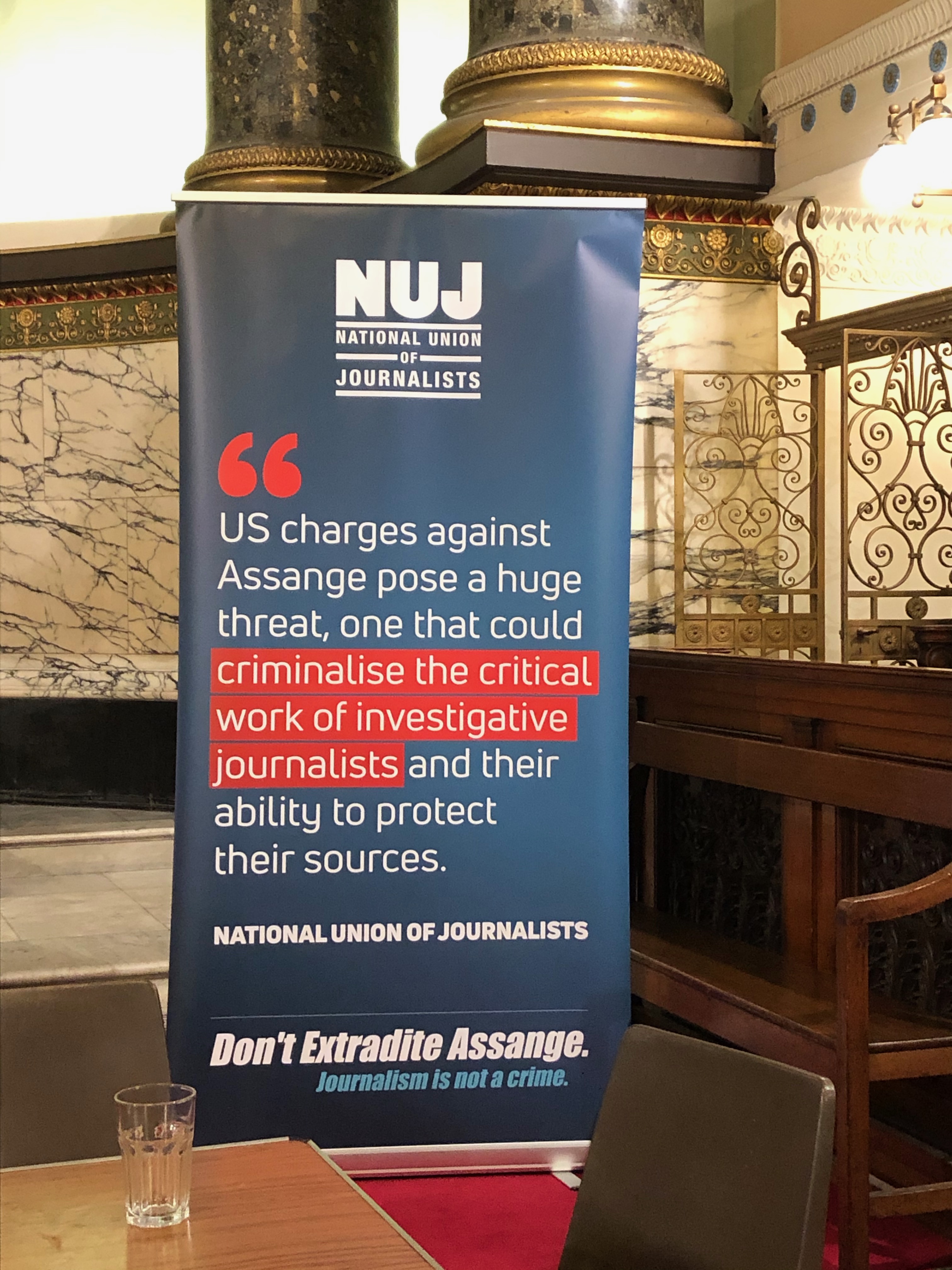
- artists to make the brutality being visited upon Assange visible
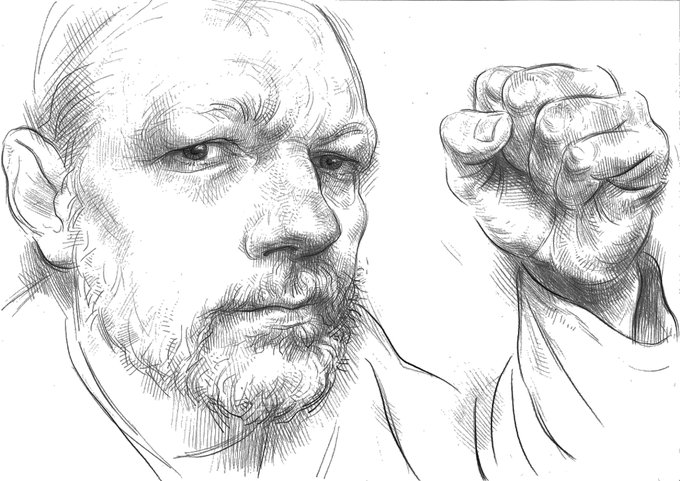
Daniel Fooks’ portrait of Assange
- academics, especially in the field of law and regulation, to reflect upon what Assange’s case means for due process
In introducing Lisa Longstaff, she revealed that she was doing so as herself a survivor of sexual violence, and pleaded to those who weaponise sexual assault to desist. She presented Nils Melzer as an example of how people can reform institutions from within. Before introducing John Pilger she noted that over sixty UK universities are currently on strike for equality, improved pay, a reasonable workload, job security, and pensions – and that some academics in the audience live in night shelters and rely on foodbanks. The NHS is being demolished by backdoor privatisation, and Pilger is about to release a film concerning this fact, The Dirty War on the National Health Service (subsequently released on 1stDecember 2019).
LOWKEY
[Rapper]
Lowkey (stage name of Kareem Dennis) opened with this quotation:
‘Because I tried to extend your liberties, mine were curtailed. Because I tried to raise the temple of freedom for you all, I was thrown into the cell of a felon’s jail’ (Karl Marx, 1852).
He continued:
‘We have to be clear what is happening here. Julian Assange is not being punished for anything he has done wrong. He is being punished for everything he has done right. This is what they call no-touch torture, crucifixion in slow motion, and while Julian Assange is the instrument, what they are attempting to crucify is the truth.
What he attempted to do is to smash through the wall of governments that are supposedly acting in our name. Let me say this: the technologies and techniques that Wikileaks used are not only those of Wikileaks – they are used by many. Why shouldn’t we violate their rules when we know that the NSA can listen to our conversations, and governments are denying our right to digital self-determination?’
In order to defend whistle-blowers, Lowkey said, we should act on the information that they give us, and spread it as widely as possible.
He noted that Assange is being charged under the Espionage Act, which was originally designed to punish conscientious objectors in World War I:
‘There were around 20,000 people in this country who refused to fight in World War I. Tens of them were sentenced to death. 6,000 were sent to prison. 80 died in prison. Only thanks to the intervention of Bertrand Russell and others were those who were sentenced to death in France saved. But where are the Bertrand Russells of today?
This is a word to the stenographers who call themselves journalists: those who demonise Assange are like turkeys voting for Christmas. They profited from the cables which he gave them. The same publications that demonise him now extract profit from those cables still. Today Julian Assange – tomorrow you. We now are on the precipice of an election like there has never been in the history of this country.’
In conclusion Lowkey said that he wished for ‘a clearer position from Corbyn on the plight of Julian Assange’, but said that we should do all we could to support his victory, which would be most likely to lead to freedom for Julian Assange.
LISSA JOHNSON
[Clinical psychologist and press officer for the open letter to the UK Home Secretary signed by over 60 doctors on 23rd November 2019 stating that if Assange is not urgently transferred to an appropriate medical facility, he may shortly die]
Lissa explained that the doctors’ advice and warnings were motivated by the principle that ‘you can’t adequately medically treat a torture victim whilst continuing to torture them’, and based on publicly-available information concerning Assange dating from his time in the Ecuadorian Embassy onwards. UN Special Rapporteur on Torture Nils Melzer had reported in May 2019 that Assange showed symptoms of prolonged psychological torture; this can easily cause severe physical effects, including life-threatening disease such as cancer and cardiovascular disease. On 1st November Melzer wrote that Assange could soon die if his conditions were not alleviated; he had recently appeared mentally and physically impaired during his case management hearing of 21st October [as described in Craig Murray’s blog post of 22nd November].
She noted that almost all major outlets in the UK (with the important exception of the BBC) covered the letter. On The Guardian website it was the most popular story despite the fact that The Guardian itself was not promoting it; this suggested that there was far more public support and sympathy for Assange than the mainstream media antagonism towards him indicated.
She reported that there had as yet been no response to the letter, other than two sentences from a Home Office spokesperson containing a blanket rejection of the letter’s purport, and a platitude to the effect that the UK always observes the rule of law. The authors will continue to press for a proper and public response to the letter. Any doctors are welcome to add their names to the letter by sending their name, title, position, and area of expertise to doctorsforassange@gmail.com.
She concluded by pointing out that it had taken only a few weeks to draw up the letter, and suggested that other professional groups – notably including lawyers – might do likewise with regard to the irregularities, illegalities, and inhumanity of the current treatment of Assange.
FIDEL NARVAEZ
[Former Ecuadorian consul in London who worked with Assange during his stay at the embassy, until the change of Ecuadorian government in 2017]
Fidel opened by saying that the imminent risk to Assange’s mental and physical health is reason enough for us to demand a change in his prison conditions. But in addition, along with Chelsea Manning, he is the most important political prisoner of today. He said that ‘the investigation for alleged sexual misconduct has opened and closed like a refrigerator door’, and that Assange is being denied the possibility of adequately preparing his defence.
He focused on the fact that Assange’s case is a precedent for the institution of political asylum. The United Nations Universal Declaration of Human Rights Article 14 states that ‘Everyone has the right to seek and to enjoy in other countries asylum from persecution’, and this right relies on the principle of non-refoulement. This had been violated by Lenin Moreno, current President of Ecuador, who in 2019 delivered a political refugee to those who sought to persecute him; indeed, his asylum was withdrawn at a point when the threats to his life and freedom were more evident than ever. He reminded us that UN Special Rapporteur on Torture Nils Melzer had replied to former UK minister Jeremy Hunt – when the latter asserted that Assange had been free to leave the embassy whenever he wanted to – that he was ‘about as “free to leave” as someone sitting on a rubberboat in a sharkpool’.
He went on to say that Moreno did not just throw him into the pool, but that he contacted the sharks in advance in order to coordinate the shark feast with them (one of the biggest sharks being Hunt himself). ‘The sharks paid for a private company to spy on him during his visits with his lawyers and his doctors’, and Moreno permitted Ecuadorian diplomats to be questioned by US prosecutors. He concluded by saying that our task was to make all those concerned – especially UK judges – feel that ‘there is a civil society that does not give up’.
LISA LONGSTAFF
[Women’s rights campaigner and spokesperson for Women Against Rape]
Lisa introduced herself as someone with extensive experience of working with women suffering from the brutality and horror of rape, including the prostitutes of the King’s Cross area [close to which the event was taking place]. She said that for over four decades there have been campaigns to secure more convictions for rape – ‘But the pursuit of Julian Assange is not about rape. It is the US weaponizing and distorting rape to get him convicted.’ She said that in 2010 and 2012 Women Against Rape noted ‘the unusual zeal with which Julian Assange was being pursued. It’s unlike any other rape investigation we have seen anywhere. The low UK rate for prosecuting rape, resulting largely from negligent and biased prosecutions and investigations, speaks volumes. The police excuse is that they are understaffed. But every resource has been thrown at Julian Assange, at great cost to the tax payer, for which he has then been blamed.’
She observed that in his case the ‘rape victims’ right to anonymity and defendants’ right to be presumed innocent’ have been denied. Assange’s accusers’ names were circulated: ‘They were trashed, their allegations dismissed as not real rape […] On the other hand, Julian Assange has been treated by much of the media as though he were guilty even though he has never been charged.’ Rather, he had been smeared, because this supported the UK government’s aim, which was extradition of Assange to the US; the smears deprived him of support, not least from many feminists. Lisa reminded us that it has been revealed that the UK pressurised Sweden not to drop the case against Assange, and said that she was glad that the politically-motivated investigation into the allegations had been dropped, because greater clarity on his case is now possible.
She observed that Assange had revealed to the world evidence of torture, murder, and rape committed by agents of the US state; in this sense, it is ‘the people who long to torture Assange’ who ‘are the rapists, torturers, murderers.’ Her organisation has worked with ‘thousands of rape victims seeking asylum from rape and other forms of torture. We’ve seen UK governments denying their stories of rape. So don’t tell us they’re concerned about victims of rape. In 2004 together with the Black Women’s Rape Action Project we wrote to every MP about rape in Iraq, Afghanistan. Not one replied.’
She reminded us that Chelsea Manning used Wikileaks to ‘expose the extent of cover up of rape of sexual violence and murder in Afghanistan, Iraq, and Bosnia’, and that she was currently being held in indefinite solitary confinement due to her refusal to testify against Assange.
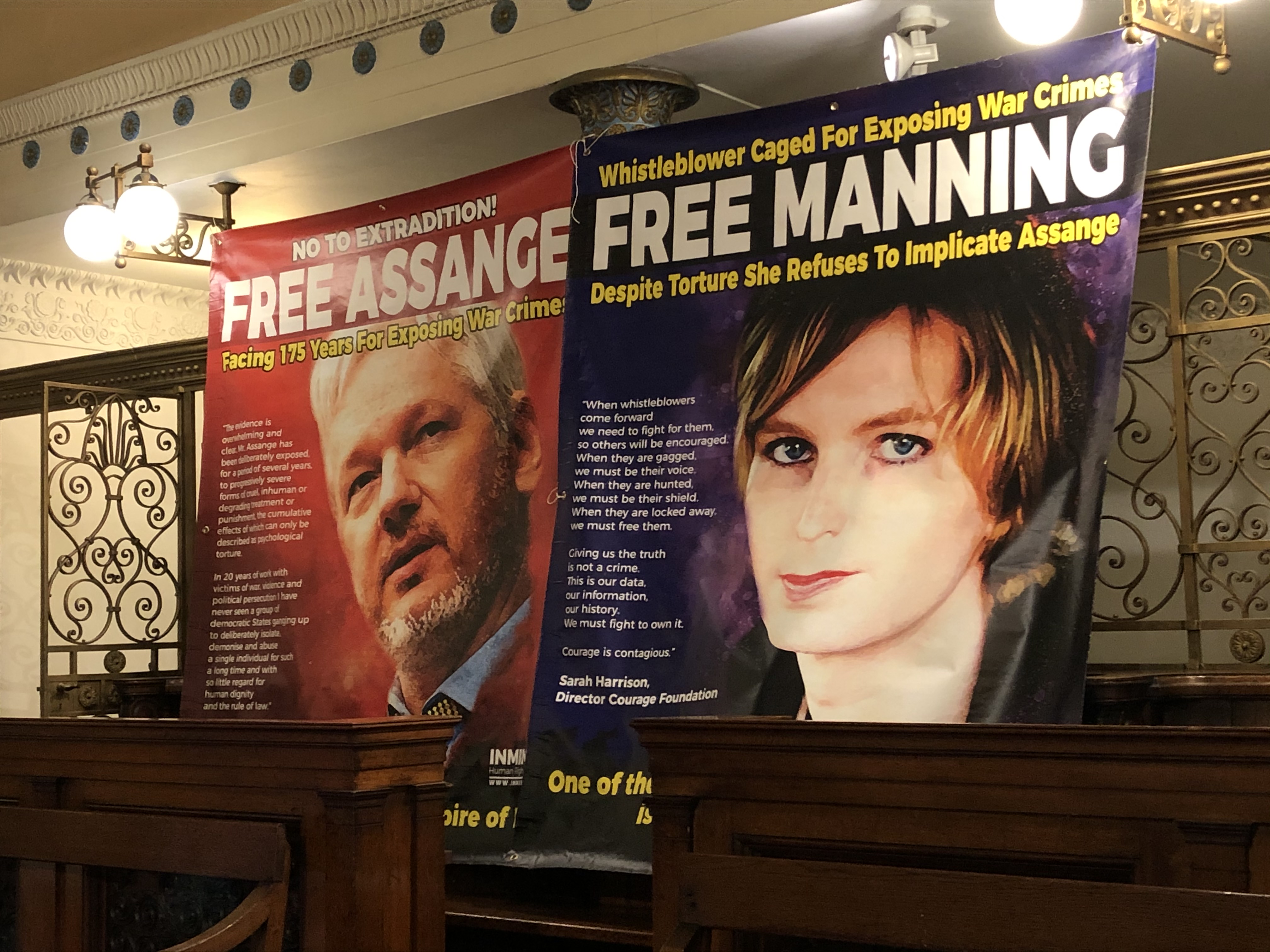
She advertised the international network Refusing to Kill, of which the website gives details on how to write to Manning. She also directed us to this website to find out how to write to Assange.
She concluded by pointing out that Assange and Manning ‘have already suffered years of isolation, confinement, public vilification – longer than many men convicted of rape. Sending someone to death, 175 years in prison, torture, in the US, has nothing to do with justice, and it is certainly not justice for rape.’
MARK CURTIS
[Historian, journalist]
Mark opened by asserting that there are far more people supporting Assange than we hear of in the media; there were five hundred of us present that very evening.
He suggested eight things that Assange’s supporters could do:
- Inform themselves, for example by reading the Defend Wikileaks website; there is no point in relying on the establishment media.
- Pressurise human rights and free speech organisations into speaking out more in defence of Assange. Amnesty International, for example, has put out only two articles (in September 2012 and October 2019) and two Tweets, supportive of him since 2012. It also stated specifically (on May 17th 2019) that it does not consider him to be a prisoner of conscience.
- Pressurise MPs. An encouraging precedent is the case of Lauri Love, whose extradition to the US was opposed in 2018, on the grounds of his ill health, by over 100 MPs. Mark noted that we were privileged to be joined this evening by Chris Williamson [who received a standing ovation]; he had put down an Early Day Motion in support of Assange, but so far only four others had signed. They needed encouragement (though ‘I know I’m confusing the UK with a democracy.’)
- Challenge the establishment media and expose its falsehoods, for example by writing to journalists; some might be moved by shame. This Wikileaks site has listed numerous, widespread falsehoods about Assange and Wikileaks. By way of context, he noted that ‘We are meeting at an extraordinary time. We are in the biggest propaganda campaign since the Second World War, to destroy Corbyn.’ By comparison, the propaganda effort in the build-up to the 2003 invasion of Iraq was trivial, although it should be noted that it was mainly the same forces involved in promoting that war as in smearing Corbyn now. The smears against Assange as a Russian asset (The Guardian’s false report of Assange secretly meeting Manafort in the Ecuadorian Embassy has still not been retracted or taken down) are deliberate falsehoods in the same vein.
- Join the campaign groups – Don’t Extradite Assange (@DEAcampaign) and the Julian Assange Defence Committee (@JA_Defence). The 24th February 2020, which is the date of the next extradition hearing, will be a global day of protest. Join that protest.
- If one is a researcher or independent journalist, research and write. Mark himself, with Matt Kennard, has set up Declassified, which publishes declassified documents on UK foreign policy. Facts such as Magistrate Emma Arbuthnot’s ‘marriage to Mr Military-Industrial Complex, and her son’s corporate links to the UK secret services’, should be discovered and widely publicised.
- Educate members of the public on why saving Assange is in their interests, not least in relation to the extraterritorial overreach of the US’s extradition request.
- Legal figures should challenge the legality of defying the findings of the UN Special Rapporteur on Torture, and its Working Group on Arbitrary Detention, and of holding Assange in a supermax prison during and after his grossly-excessive sentence for bail-skipping.
Mark concluded by stating that Assange is not a normal man: ‘he has a brilliant strategic mind combined with attention to detail – a rare combination. Normal people don’t do what he did, or survive in an embassy being spied on for years’. However, even were he not so extraordinary a man, he would deserve to be rescued from dying in a British jail. ‘So if we’re decent, we’ll do whatever we can.’
NILS MELZER
[UN Special Rapporteur on Torture]
‘It is an honour to be here. I am speaking as the UN Special Rapporteur on Torture. I have been mandated by states to report to them about their compliance with international law – with the obligations they have committed to in international treaties. This is my mandate and what I have been doing in this case. I presume that states act in good faith; that this is about applying the law; and when I engage with them, that they will say “let justice take its course”. But in my investigation I have found that it isn’t about the law. It isn’t about applying the law; because if it were, Julian Assange would not be sitting in extradition detention accused of espionage for doing what any investigative journalist would or should do. If this were about the law, he would not have been sentenced to fifty weeks for bail violation after seeking and receiving political asylum from a UN member state. If this were about applying the law, his asylum would not have been terminated. If this were about applying the law, he would not have been publicly portrayed as a suspected rapist by Sweden for more than nine years. This criminal investigation that never produced sufficient evidence even to charge him, is to disappear without sound – but it has caused damage that is irreparable. If this were about the law, the UK would allow him to prepare his defence. How is it possible that an extradition defendant has to reply that he hasn’t read the indictment against him? If this were about applying the law, Julian Assange would not be detained in a high security prison’ in what is ‘just preventative detention.’
Nils pointed out that extradition from the UK to the US on political charges is not permitted, but that what the US is accusing Assange of is ‘a prime example of a political offence. He will be exposed to a politicised trial: secret evidence behind closed doors’. According to much evidence about US supermax prisons, he would also be at risk of torture and cruel, inhuman and degrading punishment.
He said that it was clear to him that the purpose of Assange’s treatment was to scare away other journalists from doing what he had done – ‘to show to the world what happens when you expose the misconduct of a powerful state. For decades the West has received dissidents with open arms. But today Western dissidents need to seek asylum elsewhere, because the West has started to persecute its own dissidents – to muzzle and threaten them and expose them to show trials and draconian punishments in high security prisons.’
Nils visited Julian Assange on 9th May 2019 with two medical doctors: ‘As you know, we found clear evidence that he showed all the symptoms of someone exposed to psychological torture over a long period of time. Psychological torture is not “torture lite”. It is to destabilise a person mentally and emotionally to make them break. Torture always aims to break a person. You can do it through physical pain, or mental suffering.’
Assange’s psychological torture has been imposed through process violations at all stages in all of the jurisdictions concerned with his case: ‘this destabilises his confidence in his environment.’ Added to this has been his isolation, as at present in Belmarsh Prison; his loss of privacy; and his deprivation of the means of preparing his defence: despite being only a remand prisoner, he still doesn’t have access to a laptop.
Today I am extremely concerned for his life. I have written to all countries concerned. I have asked them to investigate their contributions to this situation and asked them to take measures to alleviate the situation. None of the states have agreed to investigate their contribution to the situation. None of the states have taken any measures to protect his rights. So, as the UN Special Rapporteur on Torture, if they no longer engage with those they have mandated to report back to them, I only see a dark future for us, our human rights, and the rights of our children. States have to take responsibility for what they do. Responsibility consists of response and ability. Britain and Sweden have each sent me one-page responses to my letters, rejecting my observations and saying that they have nothing further to add. What kind of response is that? They are required to engage with me, to have a dialogue, and to explain to their people why what they are doing is lawful. If they cannot respond, the presumption is that the unlawfulness of their behaviour is confirmed. There is no other conclusion I can draw. This is about democracy, the rule of law, and the need to defend it. This case is emblematic – a precedent. If the telling of truth becomes a crime, this will not just have a chilling effect on journalism – it will do away with it, and we will end up living under tyranny.’
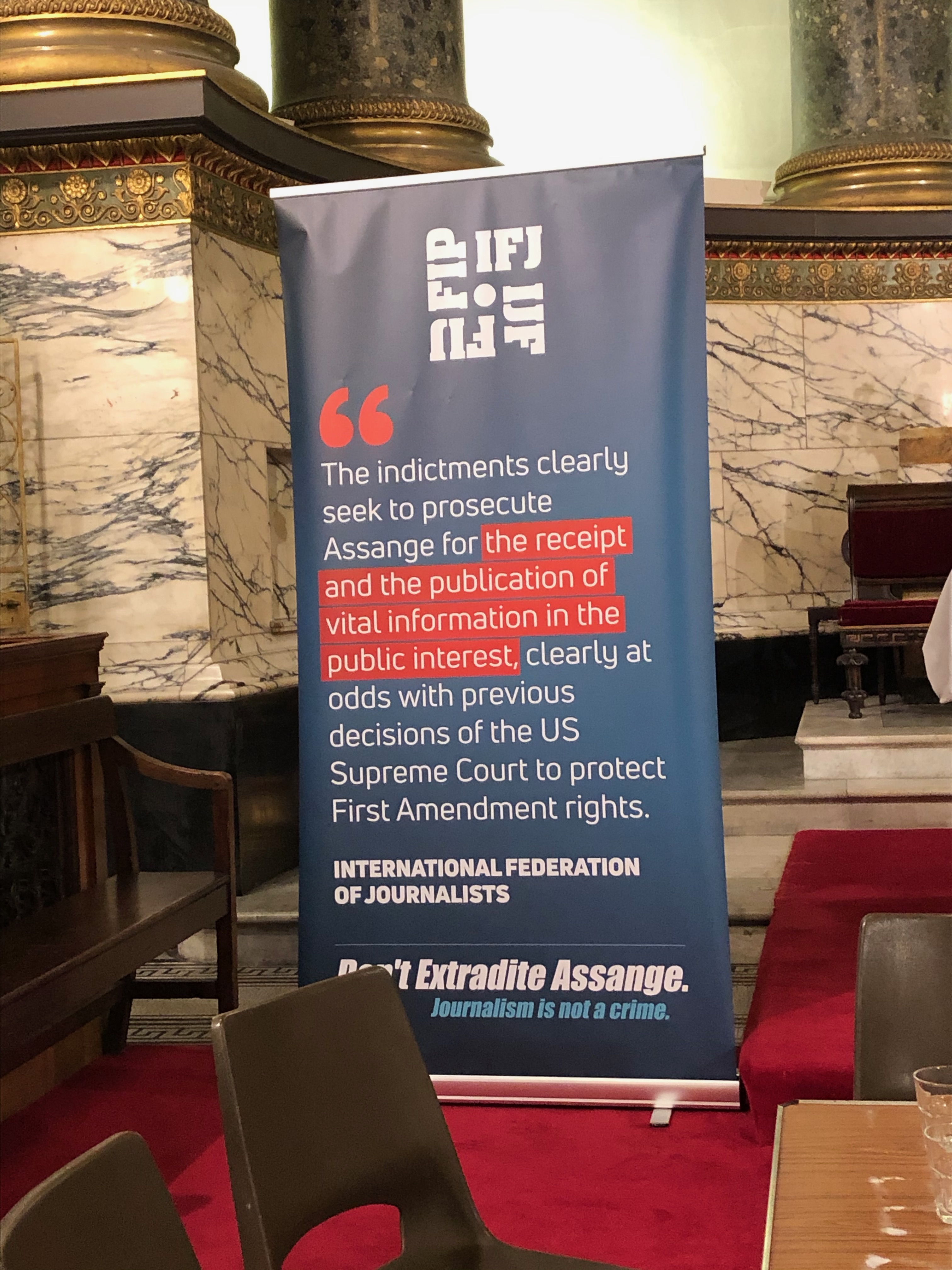
In response to a question during the question and answer session, he stressed that perpetrators of torture must not just desist, but ‘must be prosecuted and punished’, and that victums of torture such as Assange should be not just rehabilitated but compensated. He also clarified the fact that under US law there should be a fixed punishment for refusing to testify (as Manning has done in relation to Assange). Keeping someone in indefinite detention for as long as they refuse to testify, and fining them for every day in prison, is not just unlawful but is a coercive measure intended to cause severe suffering.
On the question of US personnel having allegedly been put at risk by Wikileaks’ revelations: he has seen no evidence that a single person has been harmed. ‘But on the other hand you have the two collateral murder videos. Who is asking whether these people have been prosecuted?’
CRAIG MURRAY
[Former UK ambassador to Uzbekistan, historian, journalist, blogger]
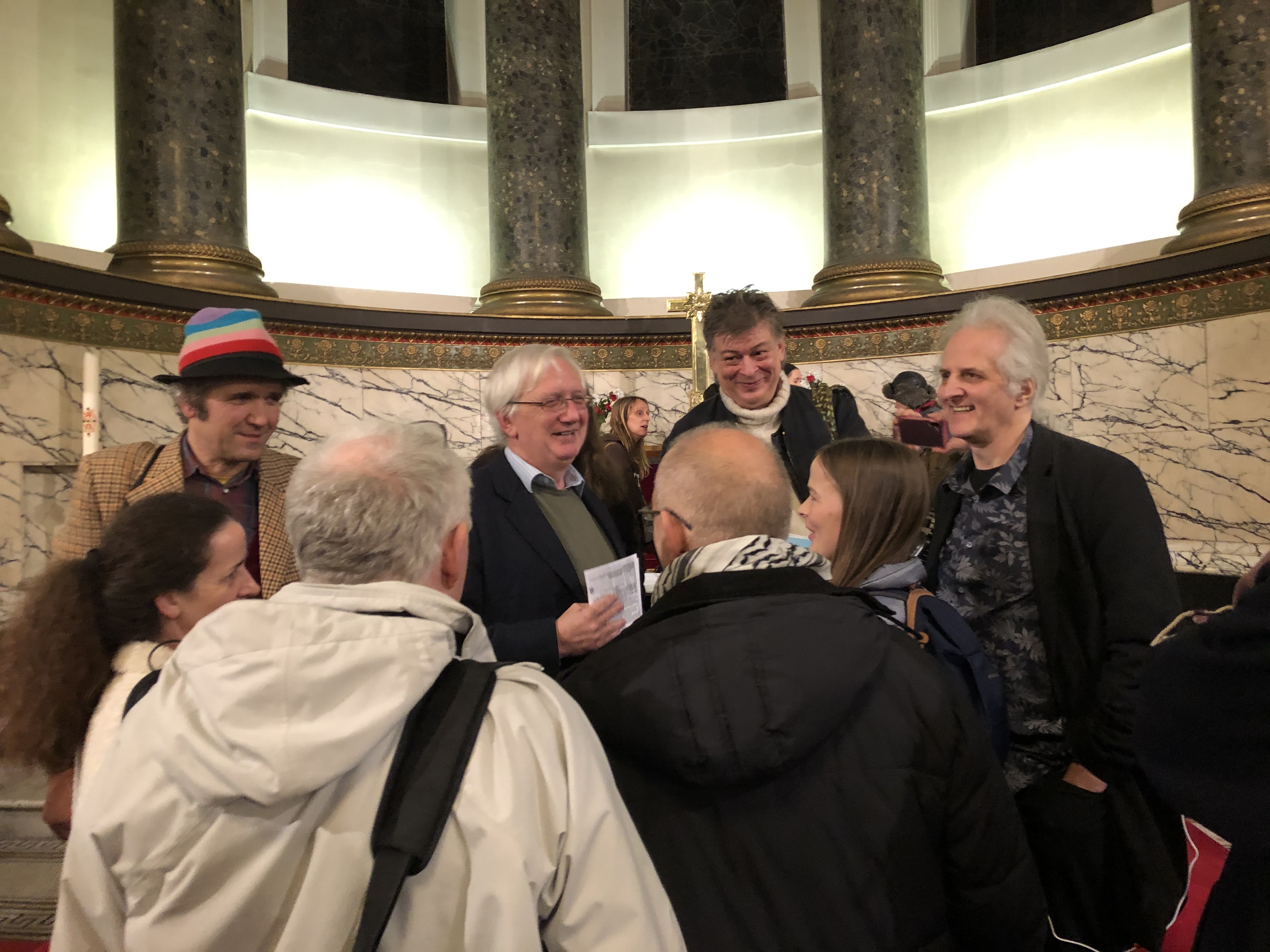
Craig Murray and others at the end of the event
‘This building [St Pancras New Church] was built long before invention of the microphone. So I’m going to speak without one. You may lose some nuance, but I’m not big on nuance.
As I came in I looked at the monuments on the back [West] wall. These include monuments to the Burnley family of Barbados, the Page family of Bombay, and the Beale family of Canton, all dated between 1790 and 1820. This means that the Burnleys would have been involved in the slave trade, whilst the Pages and Beales would have been involved in the opium trade to China. This church was built with their support.
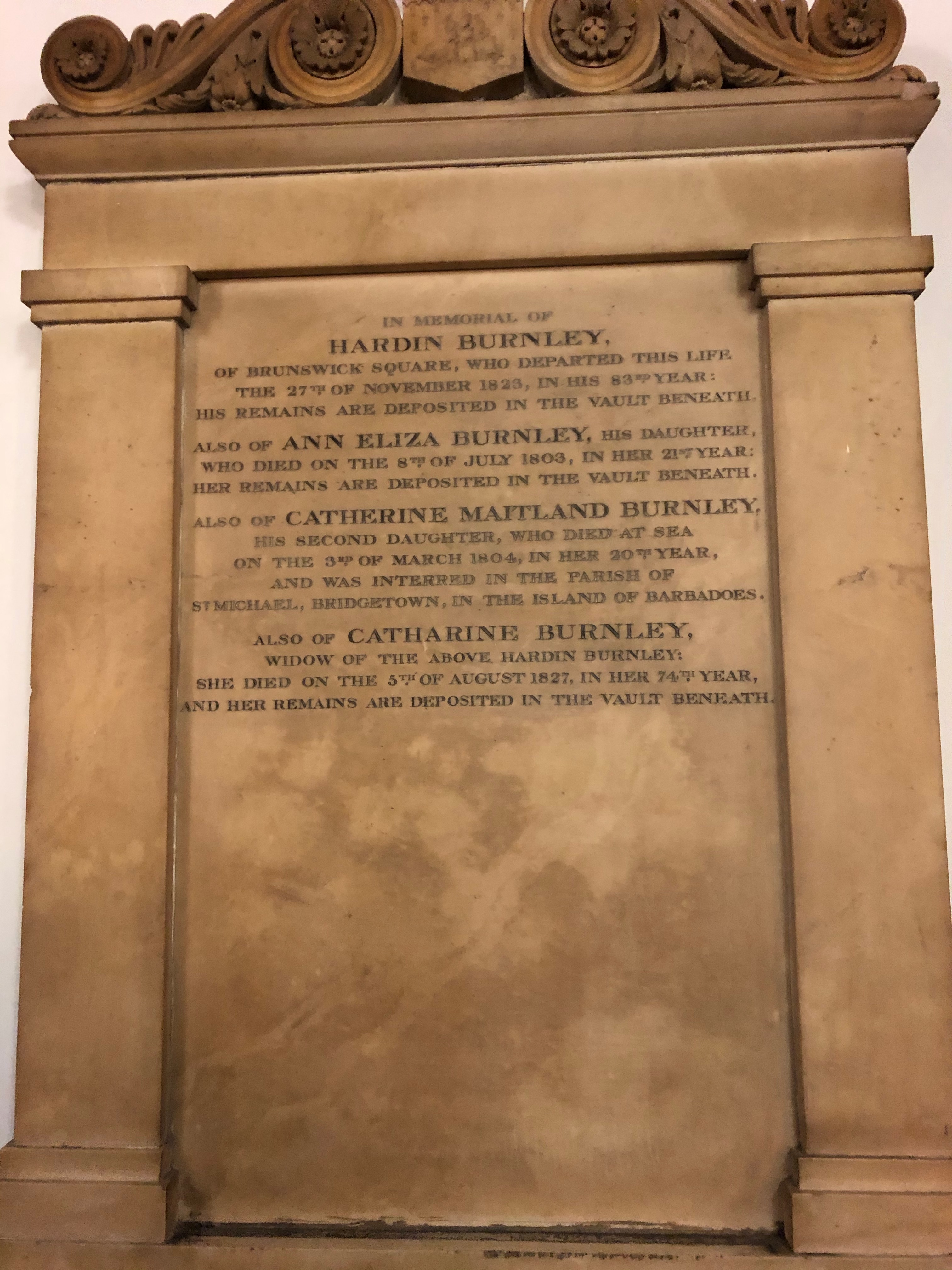
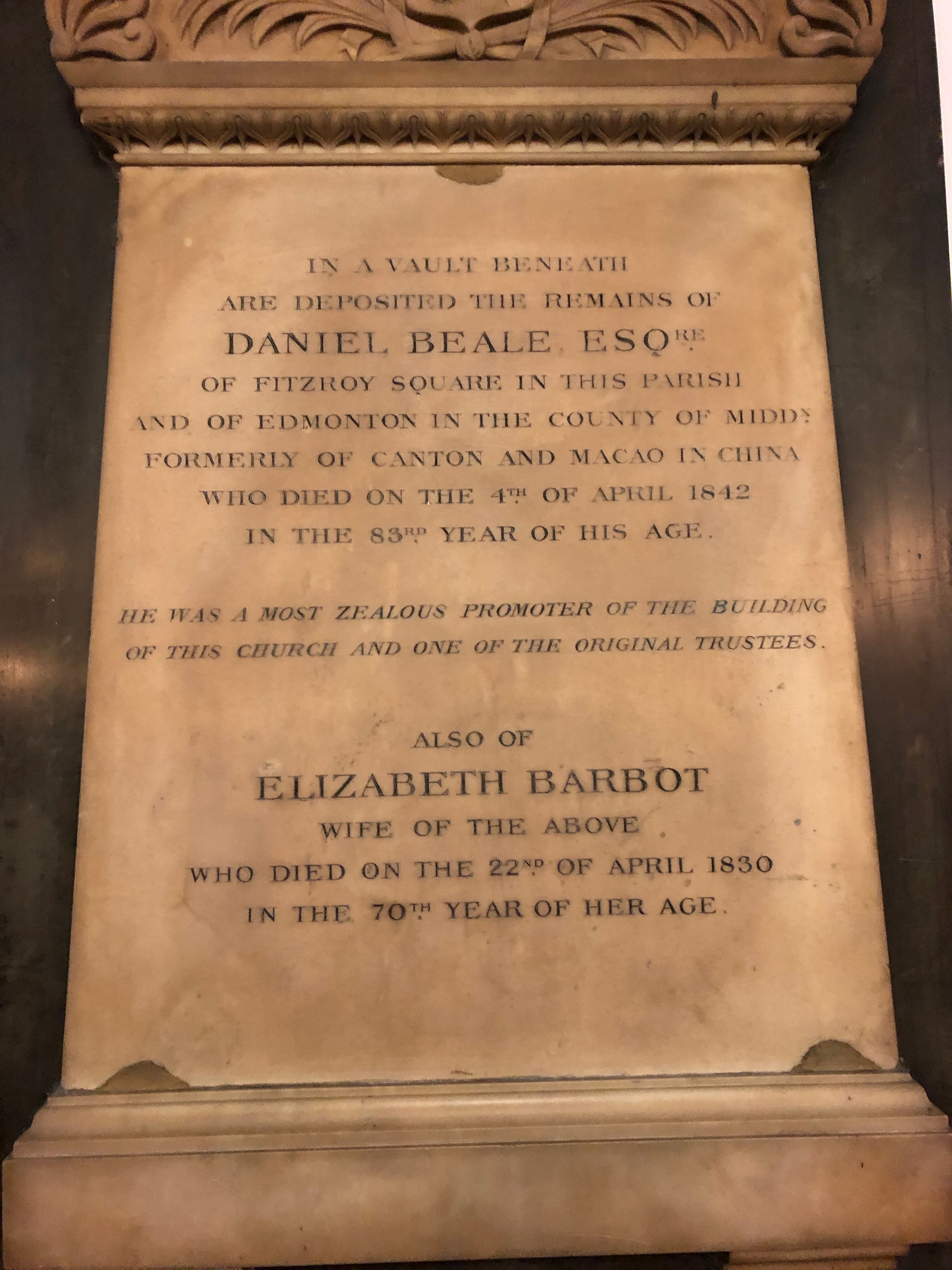
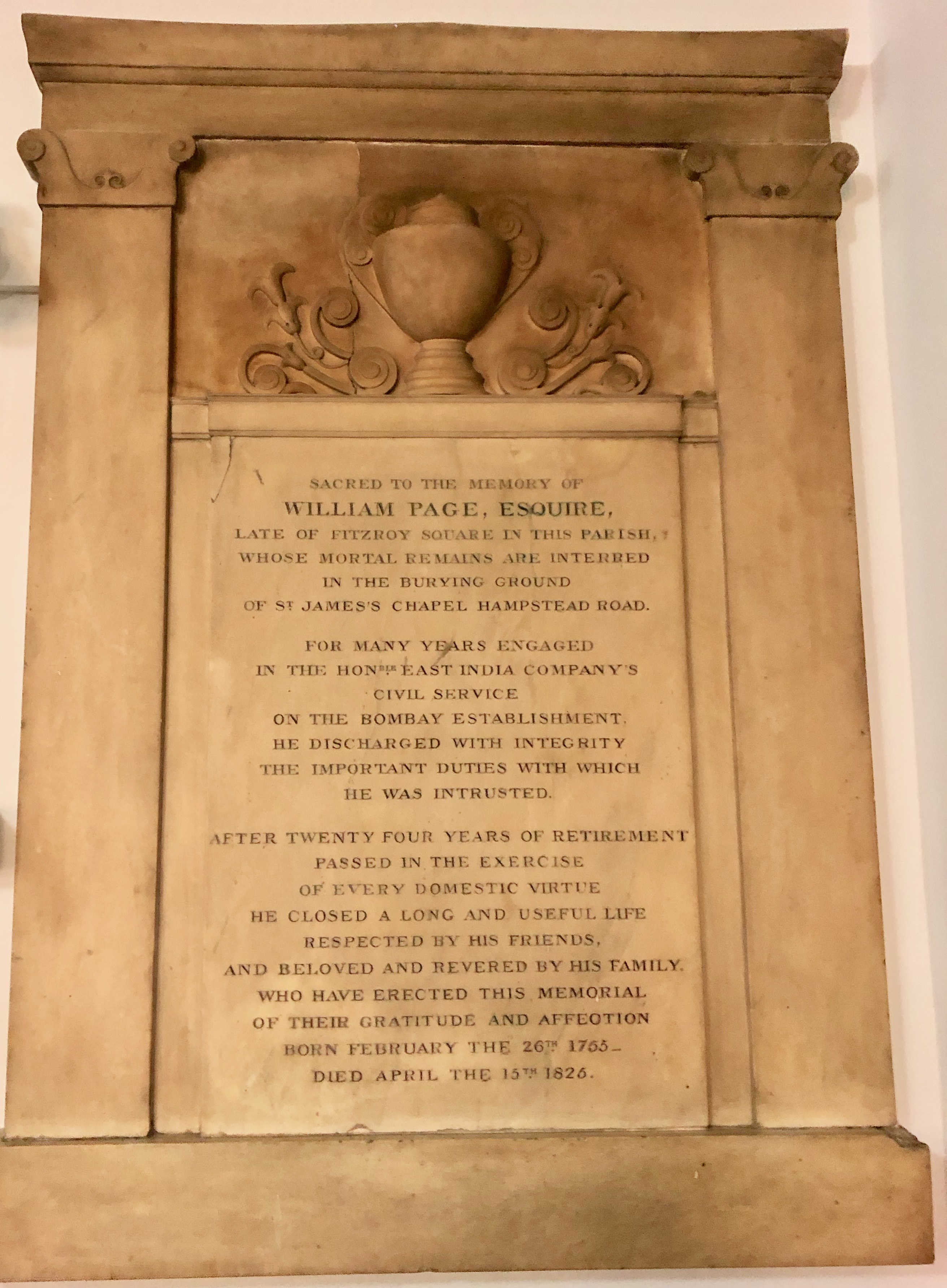
As such, ‘this church is like the British establishment, beautiful on the outside’, but actually implicated in horrors.
Craig reminded us of the legal irregularities in Assange’s treatment: ‘Lord Philips said in giving that judgment that he was going to rely on the French language version of the European treaty, because “prosecuting authority” has a wider meaning in French than in English’; Magistrate Lady Arbuthnot, who conducted the hearing of October 21st 2019, is married to a former Conservative defence minister who owns a defence company together with a former head of MI6.
With regard to the UK’s dismissal out of hand not just of the findings of the UN Special Rapporteur on Torture Nils Melzer, but also of the report of the UN Working Group on Arbitrary Detention, he noted that in ‘hundreds of cases’ the UK had supported the decisions of that working group. Having ignored it in Assange’s case, ‘the British government had the cheek three weeks ago to criticise Iraq for ignoring the report of the same working group.’
As another example of the UK’s ‘loss of international respectability’ he pointed out that three days ago ‘the government passed the deadline by which it had to return the Chagos Islands to Mauritius’; John Pilger has made a ‘great documentary about the genocide of the Chagos Islanders.’ Precisely because we live in a state which has become a rogue state, and which is ‘trying to get us into an illegal war in Syria based on fake documents and lies’, we need people like Assange to reveal the truth.
With regard to the media’s coverage of the General Election campaign, ‘there is no pretence at a level playing field. The state broadcaster is churning out relentless propaganda in support of the government.’ This makes the internet all the more important – but its freedom, like that of citizen journalism, is now under threat, since the internet’s ‘gatekeepers’ (such as Twitter) ‘hold the keys’. ‘We can no longer depend on the internet developing in ways that enhance freedom. I know of nobody who is more on top of these issues, and has a clearer understanding of how to build civil resistance, than Julian Assange.
We are entering the period of a new Cold War. The military-industrial complex seeks to benefit from a massive ramping up of Russophobia. We see it every day all around us. We are moving into dangerous times, with deliberately enhanced international instability, and a government standing for election with all the media behind it that says in its manifesto that it wants to limit the power of courts and parliament vis a vis the executive.’
Therefore what is happening to Assange is ‘part of what is happening in wider society. We will fight to get Julian out in the interests of freedom. He needs to lead us in further struggles in the future, for the next few decades.’
In response to a question during the question and answer session, he stressed that in order to create support for Assange, ‘we will need allies who don’t sit easily with us. Including those responsible for what has been done to Assange’. Any journalists who are prepared to switch from negative to positive coverage of Assange ‘we need to welcome’.
JOHN PILGER
[Investigative journalist and film maker]
‘I spent two hours with Julian Assange today in Belmarsh. I’d like to give you a glimpse of what that experience was like.’
[An article closely based on his speech was published by him on Consortium News on November 29th 2019, and is reproduced below]
‘I set out at dawn. Her Majesty’s Prison Belmarsh is in the flat hinterland of south east London, a ribbon of walls and wire with no horizon. At what is called the visitors centre, I surrendered my passport, wallet, credit cards, medical cards, money, phone, keys, comb, pen, paper.

HMP Belmarsh
I need two pairs of glasses. I had to choose which pair stayed behind. I left my reading glasses. From here on, I couldn’t read, just as Julian couldn’t read for the first few weeks of his incarceration. His glasses were sent to him, but inexplicably took months to arrive.
There are large TV screens in the visitors centre. The TV is always on, it seems, and the volume turned up. Game shows, commercials for cars and pizzas and funeral packages, even TED talks, they seem perfect for a prison: like visual valium.
I joined a queue of sad, anxious people, mostly poor women and children, and grandmothers. At the first desk, I was fingerprinted, if that is still the word for biometric testing.
“Both hands, press down!” I was told. A file on me appeared on the screen.
I could now cross to the main gate, which is set in the walls of the prison. The last time I was at Belmarsh to see Julian, it was raining hard. My umbrella wasn’t allowed beyond the visitors centre. I had the choice of getting drenched, or running like hell. Grandmothers have the same choice.
At the second desk, an official behind the wire, said, “What’s that?”
“My watch,” I replied guiltily.
“Take it back,” she said.
So I ran back through the rain, returning just in time to be biometrically tested again. This was followed by a full body scan and a full body search. Soles of feet; mouth open.
At each stop, our silent, obedient group shuffled into what is known as a sealed space, squeezed behind a yellow line. Pity the claustrophobic; one woman squeezed her eyes shut.
We were then ordered into another holding area, again with iron doors shutting loudly in front of us and behind us.
Another electronic door slid partly open; we hesitated wisely. It shuddered and shut and opened again. Another holding area, another desk, another chorus of, “Show your finger!”
Then we were in a long room with squares on the floor where we were told to stand, one at a time. Two men with sniffer dogs arrived and worked us, front and back.
The dogs sniffed our arses and slobbered on my hand. Then more doors opened, with a new order to “hold out your wrist!”
A laser branding was our ticket into a large room, where the prisoners sat waiting in silence, opposite empty chairs. On the far side of the room was Julian, wearing a yellow arm band over his prison clothes.
As a remand prisoner he is entitled to wear his own clothes, but when the thugs dragged him out of the Ecuadorean embassy last April, they prevented him bringing a small bag of belongings. His clothes would follow, they said, but like his reading glasses, they were mysteriously lost.
For 22 hours a day, Julian is confined in “healthcare”. It’s not really a prison hospital, but a place where he can be isolated, medicated and spied on. They spy on him every 30 minutes: eyes through the door. They would call this “suicide watch”.
In the adjoining cells are convicted murderers, and further along is a mentally ill man who screams through the night. “This is my One Flew over the Cuckoo’s Nest,” he said. “Therapy” is an occasional game of Monopoly. His one assured social gathering is the weekly service in the chapel. The priest, a kind man, has become a friend. The other day, a prisoner was attacked in the chapel; a fist smashed his head from behind while hymns were being sung.
When we greet each other, I can feel his ribs. His arm has no muscle. He has lost perhaps 10 to 15 kilos since April. When I first saw him here in May, what was most shocking was how much older he looked.
“I think I’m going out of my mind”, he said then. I said to him, “No you’re not. Look how you frighten them, how powerful you are.” Julian’s intellect, resilience and wicked sense of humor – all unknown to the low life who defame him – are, I believe, protecting him. He is wounded badly, but he is not going out of his mind.
We chat with his hand over his mouth so as not to be overheard. There are cameras above us. In the Ecuadorean embassy, we used to chat by writing notes to each other and shielding them from the cameras above us. Wherever Big Brother is, he is clearly frightened.
On the walls are happy-clappy slogans exhorting the prisoners to “keep on keeping on” and “be happy, be hopeful and laugh often”.
The only exercise he has is on a small bitumen patch, overlooked by high walls with more happy-clappy advice to enjoy ‘the blades of grass beneath your feet’. There is no grass.
He is still denied a laptop and software with which to prepare his case against extradition. He still cannot call his American lawyer, or his family in Australia.
The incessant pettiness of Belmarsh sticks to you like sweat. If you lean too close to the prisoner, a guard tells you to sit back. If you take the lid off your coffee cup, a guard orders you to replace it. You are allowed to bring in £10 to spend at a small café run by volunteers. “I’d like something healthy,” said Julian, who devoured a sandwich.
Across the room, a prisoner and a woman visiting him were having a row: what might be called a ‘domestic’. A guard intervened and the prisoner told him to “fuck off”.
This was the signal for a posse of guards, mostly large, overweight men and women eager to pounce on him and hold him to the floor, then frog march him out. A sense of violent satisfaction hung in the stale air.
Now the guards shouted at the rest of us that it was time to go. With the women and children and grandmothers, I began the long journey through the maze of sealed areas and yellow lines and biometric stops to the main gate. As I left the visitor’s room, I looked back, as I always do. Julian sat alone, his fist clenched and held high.’
He concluded his speech:
‘On 12th December there will be an election of a new government in Britain. There has been no mention of the journalist in Belmarsh who is Britain’s political prisoner. I don’t use that expression lightly; I don’t use it as agitprop; it’s a fact.’
John noted that ‘The indictment refers to co-conspirators [with Assange]. The Guardian is a co-conspirator, The Daily Telegraph is a co-conspirator, The New York Times, El Pais, Der Spiegel, The Sydney Morning Herald, and all the many others which published the US war crimes of which Wikileaks was the source; they’ve come only for Assange, but the warning is clear – they could come for all the rest.
If Labour should win the election or form a coalition based on a hung parliament, the new government can act decisively. Diane Abbot, if Home Secretary, will have the power to grant asylum to Julian Assange. And this she – or whoever is Labour home secretary – must do, in the name of justice, free speech, free journalism, and freedom itself.’
In response to a question during the question and answer session, he said that the idea that Assange was a flight risk was ridiculous: ‘they’ve known where he has been all the time for the last ten to twelve years’.
EMMY BUTLIN
[Committee to Defend Julian Assange]
Emmy spoke to inform the audience that Committee (@JA_Defence) meets monthly, and that all are encouraged to join. There will be a public meeting on 6th December 2019.
AMNA SHADDAD
Amna announced that Brian Eno will launch DEA’s Christmas card campaign (see below); the audience were all encouraged to take and send one.
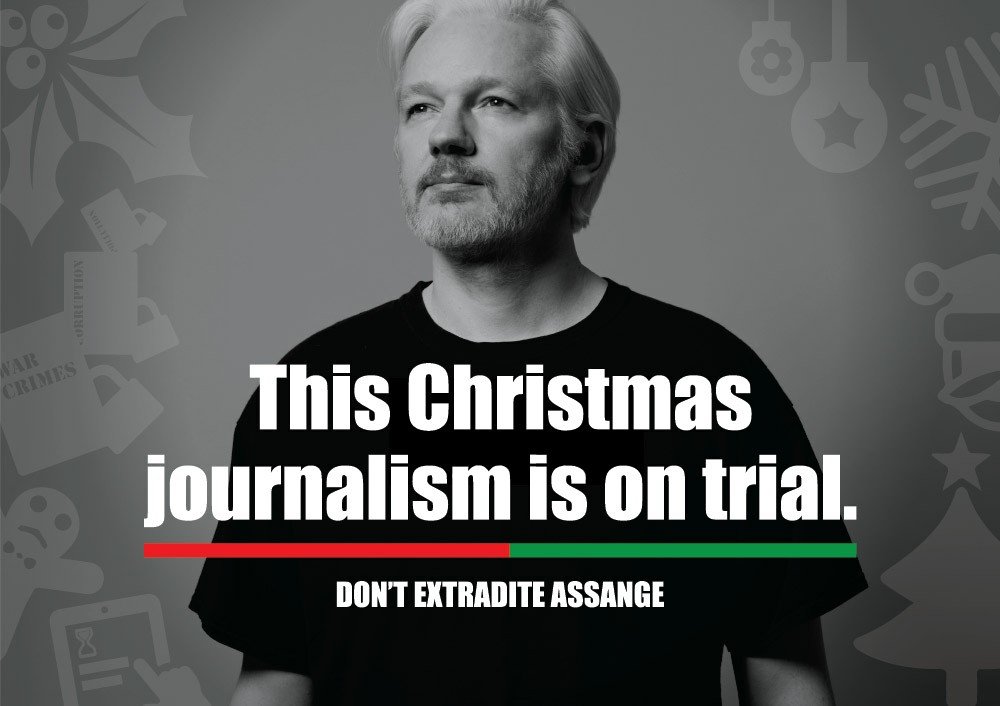
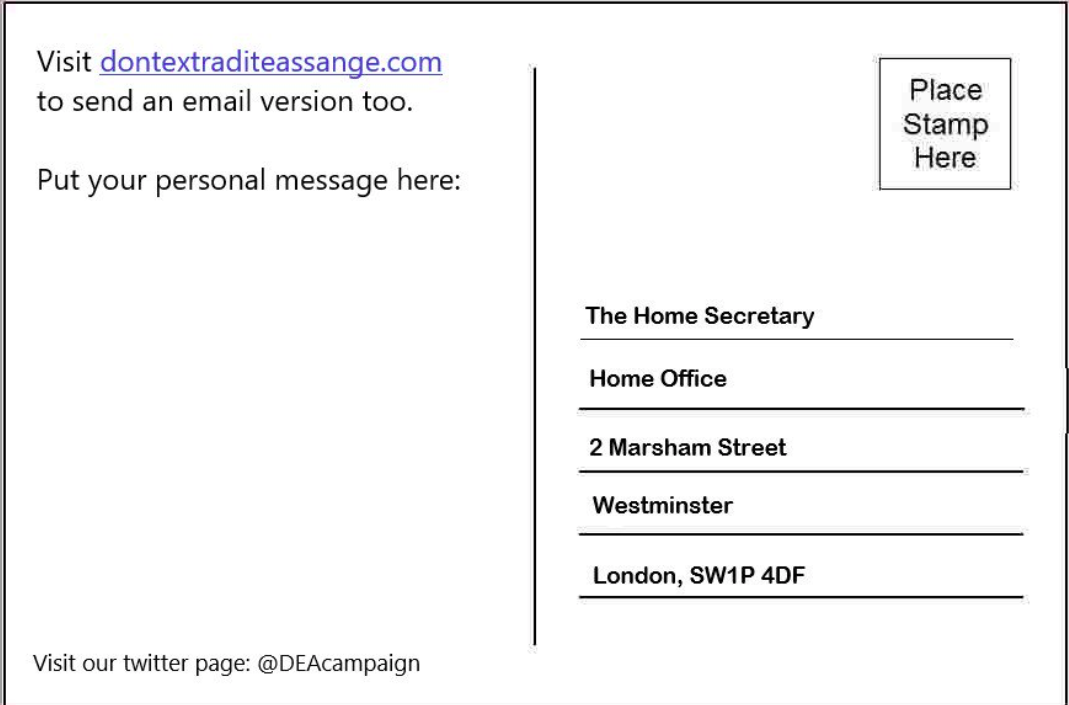
The following campaign postcard, not by @DEA, was also distributed:
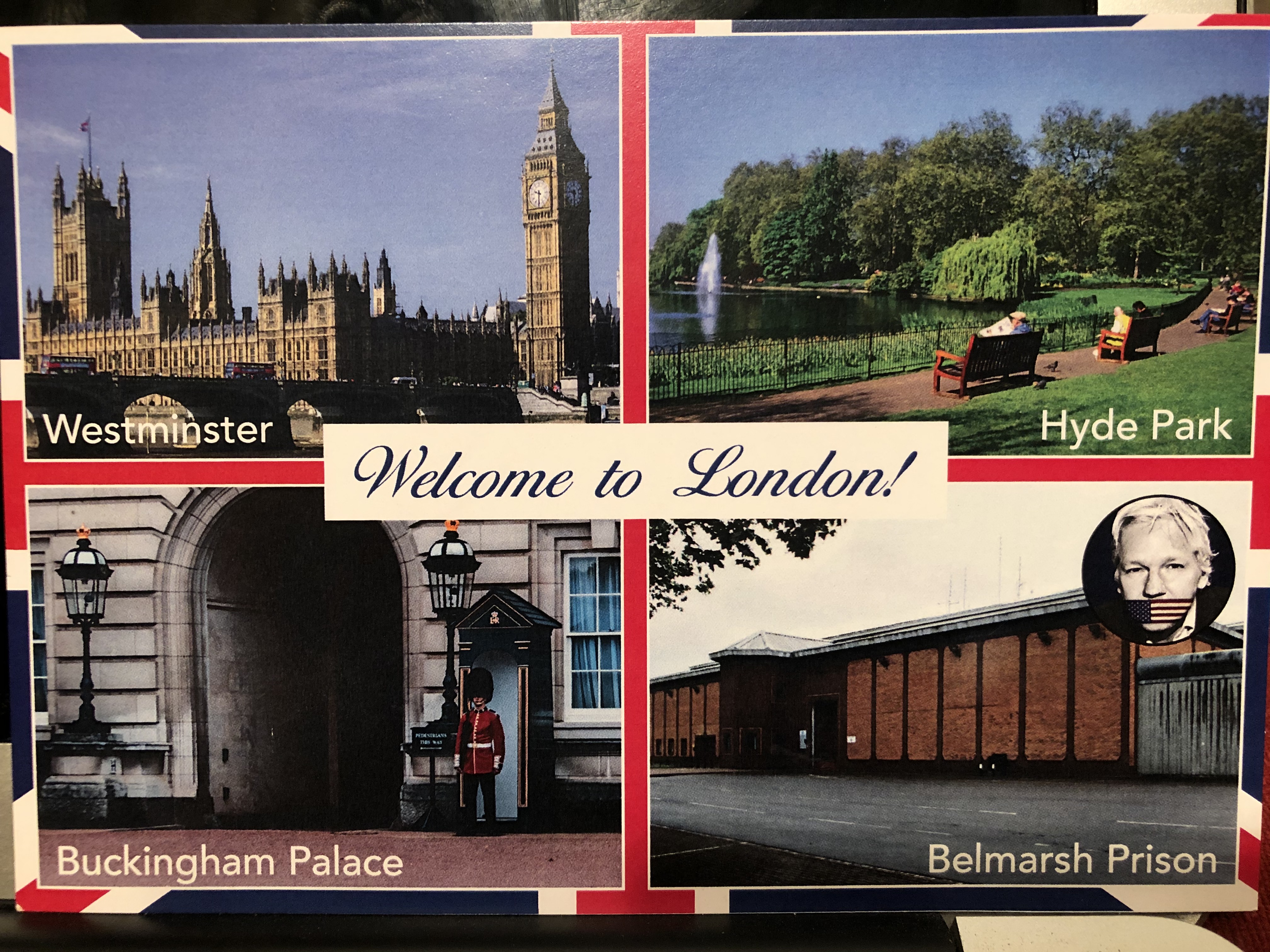
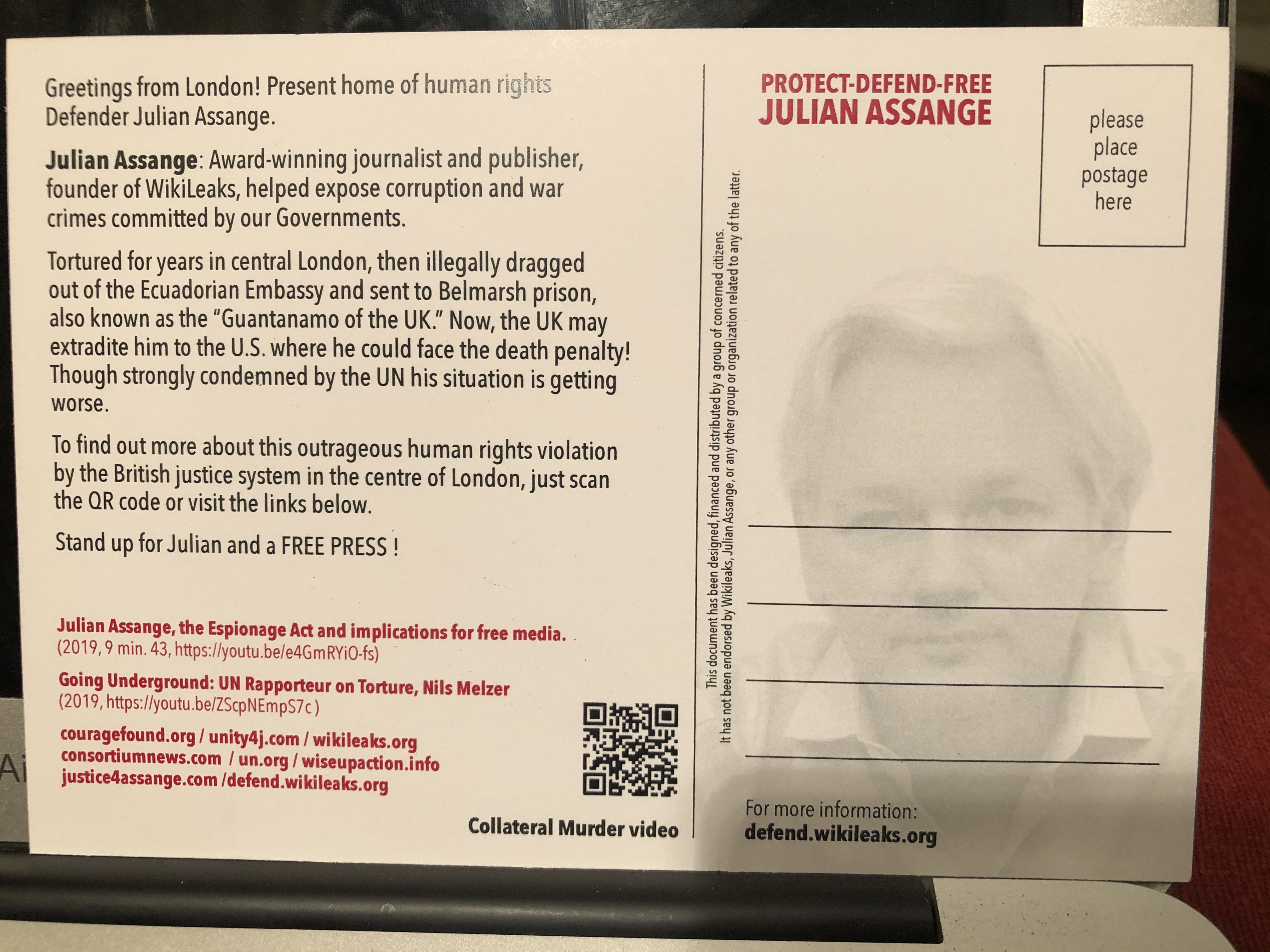
SUMMARY OF THE ASSANGE CASE
A summary of the Assange case, and a list of responses to frequently-raised concerns about Assange, were produced by Deepa and Rodney Driver, and appear below. Anyone with any suggestions for tweaks or additions is invited to contact Deepa at deepadriver@protonmail.com or @deepa_driver, and Rodney at cop01rd@gold.ac.uk
Preventing The Death Of Dissent – Why We Must Free Julian Assange
Introduction
Julian Assange set up a website called Wikileaks in order to allow whistleblowers to release evidence of wrongdoing. Wikileaks has consistently, and with 100% accuracy, released documents that show the shocking extent of the criminality of some of the world’s most powerful people and organisations. US intelligence documents show that they were trying to discredit Wikileaks as far back as 2008[i]. In 2010 Wikileaks released the files that are known as the Afghan war logs[ii], and soon afterwards released the notorious videotape known as ‘collateral murder’[iii], which shows US helicopter pilots killing civilians, children and journalists in Iraq. The US government asked its allies in the Afghan war (including Sweden) to find reasons to prosecute Julian. Shortly afterwards, Julian was accused of sexual assault in Sweden. Over the next 9 years, the US, British and Swedish governments, together with their media, have gone to great lengths to present misinformation to discredit him. There have been systematic violations of due process and right to a fair trial. He is currently in Belmarsh top-security prison, where he is very ill, awaiting extradition to the US.
The UN expert who looked into the case earlier this year said:
“In 20 years of work with victims of war, violence and political persecution I have never seen a group of democratic states ganging up to deliberately isolate, demonise and abuse a single individual for such a long time and with so little regard for human dignity and the rule of law.”[iv]
The following is a summary of the key facts. I present this in the hope that politicians, academics, journalists, bloggers, unions, campaigners and members of the public will work together to ensure that he is released from prison as soon as possible, a free man, in a healthy enough condition that he can continue with his life.
The Swedish Allegations
In Sweden, there were two alleged incidents involving two women. It is important to understand that Julian has never been charged with rape. There have only ever been preliminary investigations into allegations that in the UK would probably be described as sexual assault. Each time that a prosecutor in Sweden has looked into these allegations, charges have not been brought.
The initial police procedure when these allegations were first made was unusual. The second complainant sat in during the police interview with the first complainant. The policewoman doing that interview was a friend and political associate of the second complainant. The interview was not recorded. Each one of these should be unacceptable procedure, but together they indicate a completely corrupt process.
One allegation is that Julian tore a condom during consensual sex. The condom in question has been forensically analysed and contains no DNA (of Julian or of the complainant.) The other allegation involves initiating sex with a partner who claims to have been asleep, yet she said in a phone conversation to a friend that she was “barely awake”. There is no evidence of any offence. Julian denies both allegations. One of the women has stated that she did not intend to make an allegation of a crime – she merely wanted to force Julian to have an HIV test. She has stated that it was the police who wanted to press charges. When she heard that the police were going to prosecute, she refused to sign her statement and said she felt railroaded by the police. The behaviour of both complainants after the alleged events was inconsistent with people who have been sexually assaulted[v].
Julian was interviewed at the time by the chief prosecutor, who then concluded that there was no evidence of a crime, so the case was dropped and Julian was given permission to return to the UK, which he did. Under Swedish law, another prosecutor can pursue the case if they choose. The case was resurrected by a second prosecutor with close political connections, after a Swedish politician became involved as the women’s legal representative[vi]. The Swedish prosecutor issued an arrest warrant and an Interpol Red Notice. According to Julian’s UK legal advisor, Red Notices are usually only used for the most extreme crimes, such as terrorism.[vii]This is an example of extraordinary behaviour in relation to the Swedish case. Sweden has a history of illegally extraditing people, so it was clear to Julian that the whole thing was a stitch-up with the ultimate goal of getting him extradited to the US. He therefore took refuge in the Ecuadorean Embassy in London.
The second prosecutor wanted to re-interview Julian but refused to do so in the UK. Swedish prosecutors regularly travel to Britain to interview people. Julian was available for this but the second prosecutor deliberately left the Swedish investigation in stasis for 6 years. Yet again, this is extraordinary behaviour. The second prosecutor was eventually forced to come to Britain to interview him in 2016 and then dropped the case in 2017.
There are so many anomalies and procedural irregularities with this case that the Australian TV company, ABC, made a 40 minute documentary in 2012 explaining some of them[viii], and former British Ambassador, Craig Murray, has presented details about the discrepancies in this case on his blog.[ix] So many aspects of the Swedish case have been so obviously corrupt that no independent person who studies them in detail can possibly draw the conclusion that what is happening is fair, reasonable, or due process in any sense.
A number of specialists in rape cases have explained that the process in this case has been different from what usually happens with sexual assault allegations[x]. The authorities are:
“using rape to make a political point…the allegations against him are a smokescreen behind which a number of governments are trying to clamp down on Wikileaks for having audaciously revealed to the public their secret planning for wars and occupations with their attendant rape, murder and destruction.”[xi]
Two other key people at Wikileaks, Jacob Appelbaum and Trevor Fitzgibbon, have also been the subject of sexual allegations where no evidence was presented, allegations were withdrawn, and no charges were brought. Each target was “publicly branded and smeared as a rapist”[xii]. Both men were destroyed professionally by the allegations. In Trevor’s case the accuser was successfully sued for defamation and has retracted her allegations.
UK Corruption and Cover-Up
An Italian Journalist called Stefania Maurizi has obtained some of the documents from the UK government relating to this case. They show that the second Swedish prosecutor wanted to drop the case in 2013, but the British Crown Prosecution Service (CPS) wrote “don’t you dare…Please do not think this case is being dealt with as just another extradition.” Further emails show the UK advised Sweden not to interview Julian in the UK in 2011 and 2012[xiii]. This suggests that the CPS had no interest in justice – they just wanted the allegations to be maintained. Some of the released files are redacted (blacked-out so some parts cannot be read). The CPS has admitted that important emails were deleted when the senior CPS staff member retired, and other files are mysteriously missing. The Swedish prosecutor has admitted deleting an FBI e-mail. There have been further requests in the UK under the Freedom of Information Act (FOIA) but the CPS has refused to release its internal communications. In the most recent developments in September 2019, access to this information has been denied[xiv].
One cannot avoid the conclusion that all of the governments involved are trying to keep important information secret by making sure that it is not publicly released until it is too late for Julian. Deleting emails and losing or destroying other communications in an ongoing case is illegal. All of this is highly improper and, again, one must conclude that there is a widespread cover-up at the highest levels.
After a new President took charge in Ecuador, in 2017, the British media carried stories about faeces on the wall of the embassy, and other examples of bad behaviour by Julian, but these were all made-up. Staff at the embassy have admitted that he was polite and civil. His long facial hair was due to the embassy confiscating his razor.[xv]The coverage of Julian’s case in the British, US and Australian media has been an example of what is known as ‘narrative distortion’ where their version of events is intended to be completely misleading.
Julian was in the embassy for almost 7 years, but then the new Ecuadorean President withdrew Julian’s asylum with no due process, and he was carried out of the Embassy by six policemen. He was taken immediately to a bail hearing at a court that had been prepared in advance. He had no way to spend time with his lawyers in order to defend himself. The hearing took no more than 15 minutes and he was given the maximum penalty for bail violation. This is clearly excessive and disproportionate when one considers that he was never charged with any offence relating to events in Sweden, and the investigations into those offences had been closed by this time. Comments made by the judge during the bail hearing showed evidence of bias, with Craig Murray writing that the judge “displayed the most plain and open prejudice”[xvi].
There have been further problems with the judicial process in the UK. At a later pre-extradition hearing about charges in the US, it was discovered that the husband of the judge runs a security firm with the former head of MI6[xvii]. The husband had previously been exposed by Wikileaks. This is such an important conflict of interest that the judge should have withdrawn from the case. She was asked to do so by Julian’s legal team but refused. These legal proceedings have been compared to a kangaroo court in a dictatorship[xviii].
At the most recent hearing, another judge stated that Julian will stay in jail indefinitely after his sentence ends, awaiting extradition[xix]. This could take years. As far as the US authorities are concerned, it is clear that for Julian to be held almost permanently ‘in limbo’ awaiting hearings, unable to work with Wikileaks, is almost as effective as imprisoning him in the US.
Nils Melzer and the United Nations
Earlier this year (2019) Nils Melzer, a United Nations expert on Torture, was asked by Julian’s legal team to become involved. Initially he was reluctant to do so, as he himself admitted that
“I had been subconsciously poisoned by the relentless smear campaign… Once I looked into the facts of this case, what I found filled me with repulsion and disbelief”[xx].
It is important to know that Nils speaks fluent Swedish, so he understands the subtleties of Swedish law. After much detailed research he stated that Julian had suffered psychological torture over a prolonged period and wrote:
“Assange had been systematically slandered to divert attention from the crimes he exposed. Once he had been dehumanized through isolation, ridicule and shame, just like the witches we used to burn at the stake, it was easy to deprive him of his most fundamental rights without provoking public outrage worldwide. And thus, a legal precedent is being set, through the backdoor of our own complacency, which in the future can and will be applied just as well to disclosures by The Guardian, the New York Times and ABC News…once telling the truth has become a crime, while the powerful enjoy impunity, it will be too late to correct the course. We will have surrendered our voice to censorship and our fate to unrestrained tyranny.”[xxi]
The Big Picture
We need to be aware of the precedent Julian’s extradition will set, and the effect it will have, in two very important ways. Firstly, Julian is not an American citizen and he was not operating in the USA. The US government should have no jurisdiction over him. If he is extradited, this means that any government can arrest any individual, anywhere in the world.
Secondly, those people who have been shouting the loudest to have Julian prosecuted are playing into the hands of the worst criminals. These are the people in government who attack and destroy other nations. It is their armies who are the invaders, the occupiers, the mass murderers, the mass torturers, and the creators of war zones – regions of lawlessness where the most violent crimes, including rape, become a regular occurrence. They are the ones who should be in jail. They want to commit their crimes in secret, and Julian and Wikileaks pose a threat to their secrecy, and their ability to get away with these crimes. This is the reason that Julian has been targeted.
Never before has the US government openly talked about overthrowing other governments, such as that of Venezuela, with almost no challenge from the mainstream press. In the past the CIA had to act secretly when overthrowing governments. Journalists who expose war crimes are being prosecuted. We have seen recently, in Australia, raids on the media that exposed Australian military crimes in Afghanistan.[xxii] Dissent is no longer being tolerated. The media have become more and more afraid of their governments. Throughout the last nine years, the media have focused a great deal on events in Sweden, but they have spent very little time talking about war crimes, or the criminalisation of dissent. Saving Julian would be the first step in reversing this trend.
This case is not just about Julian. It is about the right of the people to know when governments, powerful organisations and powerful people are committing crimes, or are engaged in unethical activities. It is also about the right of the people to express critical opinions. It will have profound implications for every campaign organisation, every journalist, every protester, every academic and ultimately every citizen throughout the world. It will end dissent in the mainstream press. It will lead to self-censorship on the internet, where everyone will be afraid of what they are allowed to say. It will limit the ability of academics, researchers, unions and political organisations to express critical opinions, and it will make it harder for everyone to organise to bring about change. Right now, Julian is possibly the world’s most important political prisoner.
Concluding Remarks
There are many other irregularities to this case. Anyone who is interested in finding out more can do further research beginning with the references at the end of this article, but I hope there is enough information here to make everyone sceptical of the mainstream narrative, and aware that much of this case is fraudulent.
On 13 May 2019 a new Prosecutor reopened the preliminary investigation in Sweden. The prosecutor applied to Uppsala District Court for Julian to be detained in absentia. The court rejected the application saying that under the circumstances, the prosecutor’s application was disproportionate. Julian’s lawyer called the decision “a huge victory”[xxiii], but unless something is done, this will not stop a corrupt British government extraditing Julian to a corrupt US government. The events in Sweden have always been a smokescreen to hide the true nature of what is really going on.
Julian is not a hacker. He is a publisher. All the information that Wikileaks publishes is leaked to him. The media have carried stories indicating that Julian did not care about releasing documents containing people’s names, suggesting that he put lives at risk. However, these stories have been contradicted by Mark Davis, an investigative journalist who was present when Julian was releasing documents with newspapers such as the Guardian. Mark has stated that Julian spent a considerable amount of time redacting people’s names so they would not be harmed when the documents were released[xxiv]. The US government has admitted that Wikileaks’ releases have not led to a single death[xxv].
If anyone still wants Julian prosecuted, then this means one of two things. Either that person is a mouthpiece for the government, or that person is very naïve about what is really going on here, and about how corrupt some of our politicians, our prosecutors, our judiciary, and our media really are. There can be no doubt that Julian will not receive a fair trial at the court where he will be tried in the USA. According to former CIA agent, John Kiriakou, no National Security defendant has ever won a case there[xxvi]. If Julian is extradited, yet again he will be tried in a kangaroo court, and sent to prison for the rest of his life.
Defending Julian is no longer a controversial position. He is a hero in many countries for having exposed the crimes of the powerful. It is primarily in the US, Britain, and Australia that the media propaganda system is so effective that most people have little idea of what is really going on. There is a broadening campaign internationally to have him released, and large numbers of people have expressed their support for him online. For those who have been afraid to support Julian because they fear the mob, now is the time to work together to stand up for him. When Nils Melzer first wrote about Julian’s case, the mob went after Nils, but victims of rape, together with other campaigners, worked together to support Nils, and the mob backed down. We may only have a few months to get as many people as possible to understand how important this is.
You might ask “what can I do?” When Julian was asked what people should do, he would reply “Find out how the world really works.” The simplest thing I would like everyone to do is to forward this briefing to everyone you know. Write to your MP. Write to the newspapers and journalists. Write to organisations that you belong to. Then start talking about it. Find out if there are protests anywhere near you and join in:
“atrocity does not take place without passive, complacent, compliant bystanders: citizens watching silently, declining to take a stand…against torture and the criminalization of journalism”[xxvii]
I have one final point to make, aimed at any journalist who still supports the persecution of Julian. If you’ve ever wondered how authoritarian leaders rise to power, take a good look in the mirror. It is your journalistic propaganda that enables governments to get away with their crimes:
“Every act of ‘journalism’ that buries crucial information, and every utterance that vilifies or dehumanises Julian Assange, or sanitises his abuse, is complicit.“[xxviii]
References
[i] Wikileaks, March 15 2010, https://wikileaks.org/wiki/U.S._Intelligence_planned_to_destroy_WikiLeaks,_18_Mar_2008
[ii] ‘The “Swedish Allegations” concerning Julian Assange’,
https://justice4assange.com/Note-to-editors-Sweden.html
[iii] Wikileaks, https://collateralmurder.wikileaks.org
[iv] United Nations Human Rights Office of the High Commissioner, ‘UN expert says “collective persecution” of Julian Assange must end now’, 31 May 2019,
https://www.ohchr.org/EN/NewsEvents/Pages/DisplayNews.aspx?NewsID=24665
[v] ‘Sex, Lies and Julian Assange’, 4 Corners, ABC Australia, 23 July 2012,
https://www.abc.net.au/4corners/sex-lies-and-julian-assange/4156420
[vi] ‘Assange Case Fact-Checker’,
https://justice4assange.com/Assange-Case-Fact-Checker.html
[vii] Jennifer Robinson, Julian’s UK legal advisor, interviewed in ‘Sex, Lies and Julian Assange’, 4 Corners, ABC Australia, 23 July 2012,
https://www.abc.net.au/4corners/sex-lies-and-julian-assange/4156420
[viii] ‘Sex, Lies and Julian Assange’, 4 Corners, ABC Australia, 23 July 2012,
https://www.abc.net.au/4corners/sex-lies-and-julian-assange/4156420
[ix] Craig Murray, 7 February 2016, https://www.craigmurray.org.uk/archives/2016/02/why-the-assange-allegation-is-a-stitch-up/
[x] Caitlin Johnstone, ‘Debunking all the Assange smears’, 20 April 2019,
https://caitlinjohnstone.com/2019/04/20/debunking-all-the-assange-smears/
[xi] Katrin Axelsson and Lisa Longstaff, Women Against Rape, ‘We are women against rape but we do not want Julian Assange extradited’, Letter to The Guardian newspaper, 23 August 2012
http://www.womenagainstrape.net/inthemedia/we-are-women-against-rape-we-do-not-want-julian-as
[xii] Suzi Dawson, ‘Freeing Julian Assange: Part 1’, 8 June 2019, https://contraspin.co.nz/freeing-julian-assange-part-one/
[xiii] Stefania Maurizi, ‘Five years confined: New Foia documents shed light on the Julian Assange case’, 19 October 2015,
Update at Stefania Maurizi, ‘Seven Years Confined: How A Foia Litigation Is Shedding Light On The Case Of Julian Assange’, 10 November 2017,
[xiv] Stefania Maurizi, ‘The London Upper Tribunal Rejects La Repubblica’s Appeal on the Assange Documents’, 14 September 2019, https://www.repubblica.it/esteri/2019/09/14/news/assange_documents_appeal-235968336/
[xv] The following website has a huge list of all of the false accusations that have been made against Assange,
https://defend.wikileaks.org/2019/03/04/false-statements-about-assange-and-wikileaks/
[xvi] Craig Murray, ‘Chelsea and Julian are in jail. History Trembles’, 12 April 2019,
https://www.craigmurray.org.uk/archives/2019/04/chelsea-and-julian-are-in-jail-history-trembles/
[xvii] Craig Murray, 14 February 2018, https://www.craigmurray.org.uk/archives/2018/02/assange-judges-husband-runs-security-firm-ex-head-mi6/
[xviii] Craig Murray, ‘Chelsea and Julian are in jail. History Trembles’, 12 April 2019,
https://www.craigmurray.org.uk/archives/2019/04/chelsea-and-julian-are-in-jail-history-trembles/
[xix] Oscar Grenfell, ‘British Judge Jails Assange Indefinitely, despite end of prison sentence’, 14 September 2019, https://www.wsws.org/en/articles/2019/09/14/assa-s14.html
[xx] Nils Melzer, ‘Demasking the Torture of Julian Assange’, 29 June 2019, https://www.globalresearch.ca/demasking-torture-julian-assange/5682103
[xxi] Nils Melzer, ‘Demasking the Torture of Julian Assange’, 29 June 2019, https://www.globalresearch.ca/demasking-torture-julian-assange/5682103
[xxii] BBC, ‘Australia ABC raids expose lack of whistleblower protection’, 6 June 2019, https://www.bbc.co.uk/news/world-australia-48537374
[xxiii] ‘The “Swedish Allegations” concerning Julian Assange’, https://justice4assange.com/Note-to-editors-Sweden.html
[xxiv] Mark Davis, presentation recorded in ‘Davis assange small.mov’,https://www.dropbox.com/s/bovuj6jo4pw8ykj/Davis%20assange%20small.mov?dl=0
see also Michael West, ‘Julian Assange smears fade as Wikileaks witnesses concede he was not reckless, did protect informants’, 23 August 2019,
[xxv] General Robert Carr admitted this during the trial of Chelsea Manning, discussed in ‘Legal Communication: False Statements and Defamations Concerning Julian Assange and Wikileaks’,
https://defend.wikileaks.org/2019/03/04/false-statements-about-assange-and-wikileaks/
[xxvi] Jon Kiriakou, cited at James Wright, ‘Media Freedom is Almost Over. Only one thing can save Julian Assange from dying in prison’, 22 June 2019,
[xxvii] Lissa Johnson, 15 July 2019,
[xxviii] Lissa Johnson, 6 August 2019,
Julian’s defence statement
https://www.craigmurray.org.uk/archives/2016/12/julian-assanges-defence-statement/
I might have supported Julian Assange, but…..
Isn’t he charged with rape in Sweden?
Julian has never been charged with any offence relating to events in Sweden. In 2010, the US government asked its allies in the Afghanistan war, including Sweden, to find reasons to prosecute Julian, as a means of punishing him for revealing US war crimes. Julian was interviewed by Swedish prosecutors about events in Sweden on two occasions, first in 2010, and then by a different prosecutor in 2016. Both times, no charges were brought, as there is no evidence of a crime. The Swedish ‘preliminary’ investigation was officially closed on 19th November 2019. The UN Rapporteur on Torture, Nils Melzer, identified over 50 serious irregularities with the case, and has called for investigations in Sweden and the UK. An innocent man’s life has been ruined by smearing him for 9 years. The destruction of his reputation by the mainstream media has been so thorough that most people are afraid to speak out about his persecution.
Didn’t he help Trump win the 2016 election?
Prior to the 2016 election, Wikileaks received large quantities of information showing serious corruption in the Democratic party, where party officials had rigged their primaries to ensure that Hillary Clinton would be their candidate, instead of Bernie Sanders. All indications were that Sanders would easily beat Trump in a two-horse race. Lots of US media organisations published the Democratic Party leaks. Wikileaks has also published information that has been highly damaging to Trump.
Didn’t he collude with the Russians?
No. The whole ‘Russiagate’ narrative has been a smokescreen to enable the US Democratic party and Hillary Clinton to avoid more scrutiny for their corruption. US Judge John Koeltl dismissed the Democratic Party’s claims earlier this year.
Haven’t people died because of Wikileaks’ releases?
No. Even the US authorities have admitted that they have no evidence that anyone has died due to Wikileaks’ releases.
Isn’t he a hacker?
No. He is a publisher with a 100% accuracy record. The information made available by Wikileaks has enabled people in many countries to hold powerful people to account.
Shouldn’t he just face justice in the US?
Julian is not an American citizen and he was not operating in the USA. The US government should have no jurisdiction over him. If he is extradited, this means that any government can arrest any individual, anywhere in the world, for simply stating the truth about the crimes of that government. The court where he will be tried in the US is a special court where no defendant accused of national security issues has ever won a case.
Surely he’s being treated fairly in Britain?
Julian’s high court extradition ruling in 2011 was so perverse that Parliament changed the law afterwards. More recently, four different judges at five key hearings have demonstrated extreme bias against him. Key experts have expressed their dismay about the one-sidedness of the proceedings. The Crown Prosecution Service (CPS) illegally interfered with the Swedish case to keep Julian in limbo. Other CPS files have been illegally deleted, and the CPS is refusing to release its remaining files. He is not serving a sentence, he is just a remand prisoner awaiting hearings. Despite this he has been kept in the most extreme conditions, including solitary confinement, in Belmarsh maximum security prison. His confidential meetings with lawyers were spied on. He is not even given the right documentation and tools to prepare for his extradition hearings, and he is so ill that he is barely able to understand the court proceedings. The UN Rapporteur has classified Julian’s ordeal over the last 9 years as torture.
Why is this case so important?
This case is about the right of ordinary citizens to know when governments, powerful organisations and powerful people are committing crimes, or are engaged in unethical activities. It is also about our right to express critical opinions. If Julian continues to be persecuted and is extradited to the US on spurious charges, the case will have profound implications for every campaign organisation, every journalist, every protester, every academic and ultimately every citizen throughout the world. It will further erode the already insignificant levels of dissent visible in the mainstream media. It could lead to increased self-censorship on the internet, because whistleblowers or those expressing dissenting opinions and those media organisations or civil society groups sharing their content, may become afraid of persecution. It will make it harder for ordinary citizens to organise to bring about change when crimes are being committed by those in positions of power.
What can I do?
Write to the newspapers, broadcasters and journalists, and explain how important it is for them to hold the government to account. Debunk the smears and the myths. Challenge false reporting. If you are a journalist, or work for a newspaper or a broadcaster, talk to other journalists and producers. Remember that “Every act of ‘journalism’ that buries crucial information, and every utterance that vilifies or dehumanises Julian Assange, or sanitises his abuse, is complicit” (L. Johnsson)
Write to your MP. Help to convince them that Julian must not be extradited and should be released immediately. Contact prospective parliamentary candidates and door-to-door canvassers. Ask them for their position on Julian and inform them of the facts.
Write to human rights, refugee and free speech organisations, including journalist unions, urging them to be more vocal and more proactive.
Write to organisations that you belong to. Organise in your local community group, church, student union, trade union, or political party. Talk about it with everyone you feel able to.
Find out if there are protests anywhere near you and join in. Sign petitions and letters supporting Julian.
“Atrocity does not take place without passive, complacent, compliant bystanders: citizens watching silently, declining to take a stand…against torture and the criminalization of journalism”
(L. Johnsson)
* This document has replicated materials from the Courage foundation, Dr Lissa Johnson and other scholars.

